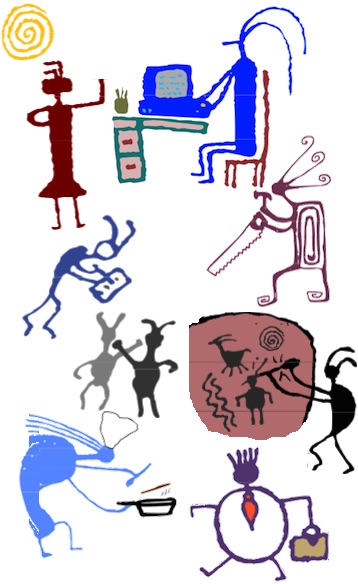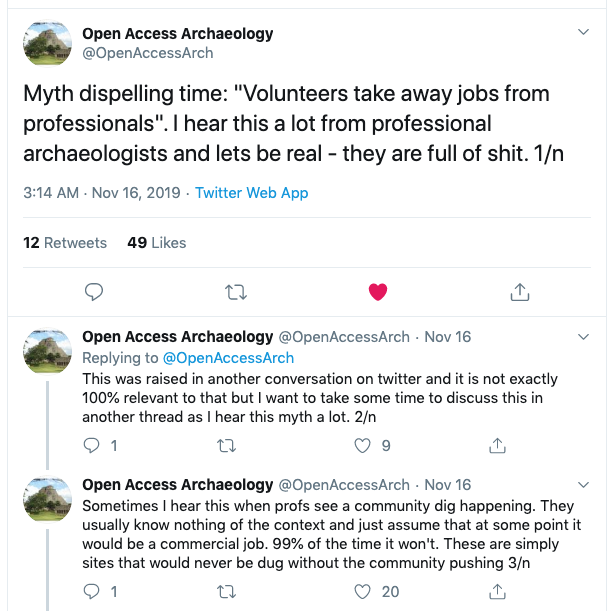
Volunteer engagement is controversial, and I do my best to keep up with the controversies, like movements opposed to volunteerism, or politicians that think volunteers are free. The most common conflict regarding volunteerism, at least in my opinion, arises regarding volunteer engagement as a way to replace paid worker, usually the result of statements by management and funders about how “volunteers save money” and what their dollar value is (something the Points of Light Foundation and others heavily promote). But there are other controversies, like the appropriateness of volunteers undertaking certain roles, or the ethics of volunteering at all, per the criticisms of people on both the far right and the far left of the political spectrum.
An example of several controversies regarding volunteering rolled into one conversation is a debate that recently broke out on Twitter about the ethics of involving volunteers in archeology (or archaeology, as the British spell it). I found out about it because I was doing my usual search of the word volunteer on Twitter, just to see what might come up. As a result, I found this thread from Open Access Archaeology (@OpenAccessArch), which said:
Myth dispelling time: “Volunteers take away jobs from professionals”. I hear this a lot from professional archaeologists and lets be real – they are full of shit.

The thread goes on to talk about all the reasons that volunteer engagement in archeology does NOT take paid work away from professionals, and I believe it does a good job. My only addition would be that, by involving volunteers, the field of archeology greatly expands the number of people who can talk from a place of first-hand experience about the importance of historical discovery and cultural preservation, thereby, potentially, cultivating and an even greater number of supporters for its cause. Volunteer engagement lets people who are NOT professionals into seeing work firsthand, and that can translate into donations and more public support.
Too often, people think involving volunteers means allowing anyone, with no training and no supervision, to do highly-specialized work or work on sensitive issues. It does NOT, anymore than you are required to hire a professional with no training and no supervision, to do highly-specialized work or work on sensitive issues. You still get to have standards! You still get to have a bar for participation and require volunteers to be able to clear that bar.
Coincidentally to all this, just two months ago, I found out that the Oregon Archaeological Society provides Archaeology Training for potential volunteers: OAS Basic Training, also known as Archaeology for the Curious, is an annual program taught by experienced regional professionals from organizations such as the U.S. Forest Service, BLM, and the University of Oregon. The sessions are typically held on six Saturdays starting in the early part of the year at a local university.
Topics for the first two sessions include archaeology basics as well as information on artifacts, laws and ethics, Northwest archaeology and rock art, site stewardship and volunteering. The four additional training sessions cover field excavation, laboratory methods, site mapping, cataloging and compass reading. The program is a great way to network with other archaeology lovers and to learn how you can get involved in the field.
So, that’s the bar for involving in archeology in Oregon: you have to take this class, you have to fulfill that training commitment, and only then can you apply to be a volunteer and be a part of digs. That means not anyone can come in and just start digging. That means people who might be careless or disrespectful are more likely to be screened out. Plus, imagine what this program cultivates: people from various professions, various communities, who get a greater appreciation for archeology and historical preservation in this state, and that appreciation has the potential to get translated into donations and pressure on government to support historic initiatives and, yes, research. It translates into people talking to friends and neighbors about NOT disturbing sites, not marking such with graffiti, not taking artifacts, and on and on, in a way that just a flyer or lecture may not. THAT is the power of volunteer engagement – not money supposedly saved.

If you have benefited from this blog or other parts of my web site and would like to support the time that went into researching information, developing material, preparing articles, updating pages, etc. (I receive no funding for this work), here is how you can help.
